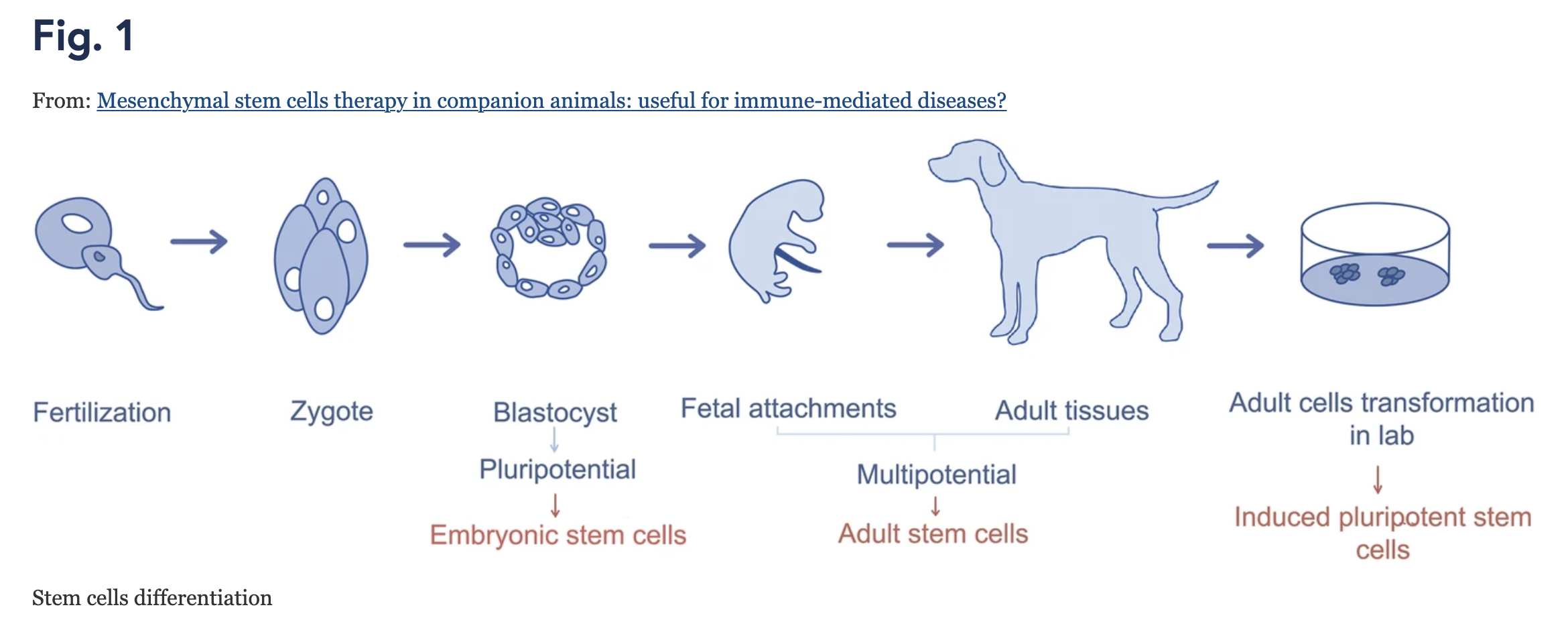Mesenchymal stem cells therapy in companion animals: useful for immune-mediated diseases?

Elita Summary:
Mesenchymal Stem Cells and Immune-Mediated Diseases in Companion Animals
At Elita, we are dedicated to advancing medicine for pets and closely monitor global research to inform our services and collaborative efforts. As Australia’s first stem cell bank for pets, we are particularly interested in studies that illuminate the broad therapeutic potential of mesenchymal stem cells (MSCs), especially for challenging conditions where conventional treatments have limitations.
A comprehensive review published in BMC Veterinary Research in 2019 by Dias et al. provides a critical overview of MSC therapy in companion animals for various immune-mediated diseases. This review highlights the remarkable immunomodulatory capabilities of MSCs and their potential to offer safer and more effective alternatives to traditional long-term pharmacotherapy.
Review Focus at a Glance
This review synthesises current research on the therapeutic potential of MSCs in treating several significant immune-mediated diseases in companion animals:
- Canine Atopic Dermatitis (CAD)
- Feline Chronic Gingivostomatitis (FCGS)
- Inflammatory Bowel Disease (IBD)
- Feline Asthma (FA)
The authors compare MSC therapy with conventional treatments for these conditions, emphasising the need for novel strategies given the adverse effects and limitations of current drug regimens (e.g., glucocorticoids, cyclosporine, monoclonal antibodies).
What Did They Find? The Immunomodulatory Promise of MSCs
The review underscores that MSCs possess potent immunomodulatory properties, making them promising therapeutic agents for autoimmune disorders. Their mechanisms of action include:
- Immune Cell Modulation: Suppressing proliferation and function of T and B lymphocytes, modulating dendritic cells, and promoting regulatory T cell development.
- Cytokine Secretion: Releasing anti-inflammatory cytokines and inhibiting pro-inflammatory cytokines
- Tissue Repair and Regeneration: Beyond immune modulation, MSCs contribute to tissue healing, which is crucial in chronic inflammatory conditions.
Specifically, the review highlighted:
- Canine Atopic Dermatitis: Studies suggest MSCs can reduce clinical signs, decrease pruritus, and modulate immune responses in CAD, offering a potential alternative to long-term corticosteroids or cyclosporine with fewer side effects.
- Feline Chronic Gingivostomatitis: MSC therapy has shown promise in reducing inflammation and improving clinical outcomes, addressing a condition often refractory to conventional medical and surgical treatments.
- Inflammatory Bowel Disease: MSCs have demonstrated an ability to mitigate intestinal inflammation and improve clinical scores in IBD models and some clinical cases, leveraging their anti-inflammatory effects within the gut.
- Feline Asthma: Pre-clinical and early clinical work indicates MSCs can reduce airway inflammation and improve lung mechanics, potentially offering a new avenue for managing chronic feline asthma.
Across these diseases, the review pointed to MSCs' potential to reduce reliance on conventional immunosuppressants, which are often associated with significant side effects and limitations in long-term use.
Strengths of the Review
- Comprehensive Scope: Addresses a range of challenging immune-mediated diseases in both canine and feline patients.
- Comparative Analysis: Directly compares MSC therapy with conventional treatments, highlighting the clinical need for new options.
- Focus on Immunomodulation: Clearly elucidates the mechanisms by which MSCs exert their therapeutic effects, providing a scientific basis for their application.
- Identifies Gaps: Points to areas requiring further research, fostering future advancements in the field.
Limitations (and Opportunities for Further Research)
As a review, it synthesises existing data, but it also identifies key limitations in the broader body of research:
- Variability in Study Design: Differences in MSC sources, doses, administration routes, and treatment protocols across studies can make direct comparisons challenging.
- Limited Large-Scale Clinical Trials: While promising, many studies are still small-scale or preclinical, necessitating larger, well-controlled clinical trials to establish efficacy and optimal protocols.
- Long-term Outcomes: More data are needed on the long-term efficacy and safety of MSC therapy for these chronic conditions.
- Standardisation: The need for standardised characterisation of MSCs and their quality control is crucial for consistent therapeutic outcomes.
Why It Matters to Us
This review reinforces the foundational principles upon which Elita is built: the remarkable therapeutic capabilities of mesenchymal stem cells. The strong immunomodulatory effects of MSCs, as highlighted in this paper, make them particularly valuable for complex immune-mediated diseases where conventional treatments often fall short or carry significant risks.
For our veterinary partners, this body of research provides a scientific basis for considering autologous stem cell banking. Storing a pet's own (autologous) stem cells ensures immediate access to a perfectly matched, immunologically compatible treatment source should a future need arise. This approach minimises any risk of immune rejection and aligns with the growing trend towards personalised medicine in veterinary care.
Studies like this review underscore the potential for autologous stem cell therapies to revolutionise the management of chronic and debilitating immune-mediated conditions in companion animals, offering new hope for improved quality of life and reduced reliance on long-term systemic medications. At Elita, we are proud to offer the infrastructure to facilitate these cutting-edge therapies, empowering veterinarians to provide the best possible care for their patients.
